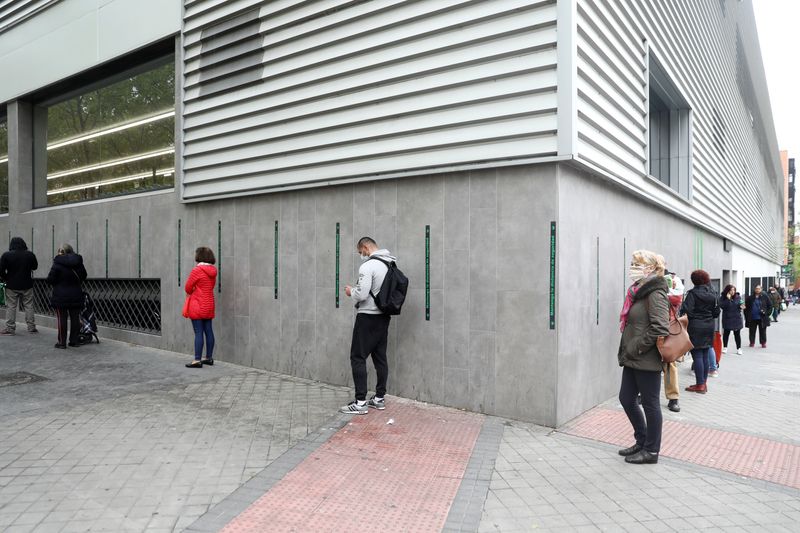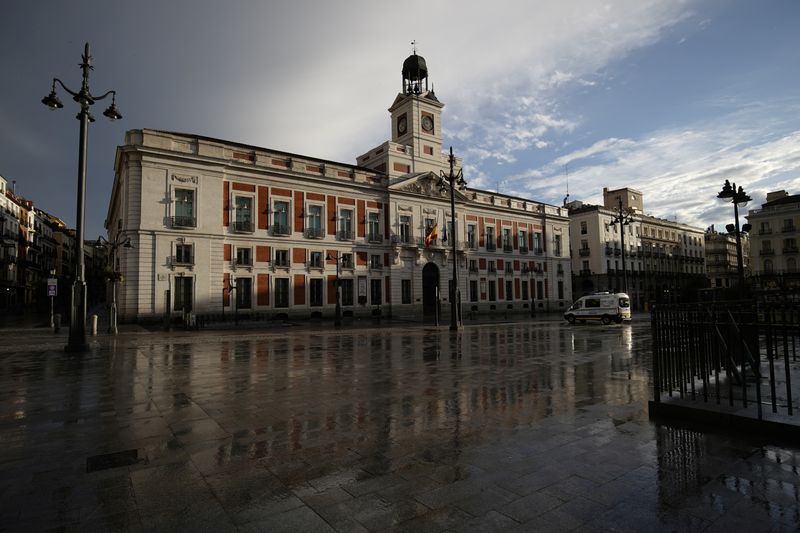MADRID (Reuters) – Spain’s economy shrunk by its biggest amount on record, 5.2%, in the first three months of 2020 due to the crippling impact of the coronavirus crisis, preliminary data showed on Thursday.
The National Statistics Institute’s figure was the worst since the historical series began in 1970 and exceeded analysts’ forecasts of a 4.4% contraction versus the previous quarter.
Spain has had one of the world’s worst outbreaks with more than 24,000 COVID-19 fatalities and in mid-March imposed one of the strictest lockdowns, though officials are confident the worst has passed and want to start easing measures next month.
With the second quarter likely to be even more painful, the central bank predicts the tourism-dependent economy could shrink as much as 12.4% this year though it also foresees a recovery of at least 5.5% in 2021.
The government has until Thursday night to send its own forecasts for the year to the European Union (EU).
With the economy in hibernation since a March 14 lockdown, Spain had already registered another record for its economy of losing nearly 900,000 jobs in the second half of that month.
Beaches and hotels lie empty in a tourism sector that normally accounts for 12% of gross domestic product. Another big driver, the real estate market, is at a standstill.
On an annual basis, Spain’s economy shrank by 4.1% in the first quarter, down from a 1.8% increase in the previous three-month period, versus economists’ expectations of a 3.2% contraction.
CONSTRUCTION PUMMELLED
Household spending plunged 7.5% in the first quarter compared to the previous period.
Unlike private consumption, public spending is one of the few areas growing, up 1.8%, amid heavy state intervention to combat the coronavirus.
The construction sector, which was particularly hard hit during the 2008 financial crisis, had begun to recover in recent years, but saw investment fall by 9.6% in the first three months of the year, more than any other area.
The retail, transport and hotel sector contracted by 11% in the first quarter, a figure never before seen in Spain’s economy.
“This crisis will be worse for hotel workers than 2009 was for construction. At least then we still had tourism,” said Francisco Rullan, who works at a hotel in Mallorca.
Prime Minister Pedro Sanchez’s government is calling for a national pact between political parties and other stakeholders to decide on a recovery plan.
“In order to try to avoid further falls, it’s necessary to agree on a plan to rebuild the Spanish economy,” Transport Ministry José Luis Ábalos told Cadena SER radio.
Gonzalo Gortazar, chief executive of Spain’s third largest bank Caixabank SA <CABK.MC>, said the second quarter was looking even worse for the economy given more weeks of lockdown.
“At the end of the second quarter, depending on the calendar for easing the lockdown, we should start to grow but it would be gradual, I am afraid,” he said on a media briefing.
(Additional reporting by Inti Landauro and Joan Faus; Editing by Andrew Cawthorne)























